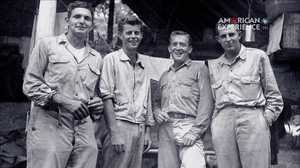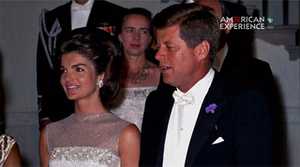The Cuban Missile Crisis
Over the course of 13 days in October 1962, Kennedy avoided war with the Soviet Union through a willingness to proceed with caution -- and a gamble that Premier Nikita Khrushchev was just as horrified at the prospect of nuclear obliteration as he was. The negotiation would come to be known as the Cuban Missile Crisis and would be one of Kennedy's most lasting legacies.
Transcript:
Narrator: The Soviets seemed intent on testing the quarantine line that Saturday. A U.S. ship dropped depth charges on a Soviet submarine in the Caribbean. And, most harrowing, an American spy plane on a mission over Cuba fell off the radar.
Robert Caro, Writer: You hear the moment on the tape. A messenger comes into the room. You hear Jack Kennedy, for a moment he's flustered.
Robert McNamara, Secretary of Defense (archival audio): The U-2 was shot down. They fired against our low-altitude surveillance.
John F. Kennedy (archival audio): A U-2 was shot down?
Robert McNamara, Secretary of Defense (archival audio): Wright just said it was shot down.
Robert Caro, Writer: We have said that if Russia shoots down one of our U-2 reconnaissance planes, we will immediately retaliate. We'll immediately bomb that missile site that took out the plane, and then we will prepare for an all-out invasion.
And you hear in the background this chorus of voices: "We said we'll retaliate. We have to do it right now."
Maxwell Taylor, General (archival audio): We should retaliate against the SAM site, and announce that if any other planes are fired on, we will come back and... It looked good then and it still looks good to me.
Robert Caro, Writer: You know what Kennedy says? He says, "Well, let's take a break, gentlemen."
Time and again, when the hawks in that room, when the Joint Chiefs of Staff are insisting on invading, Kennedy pulls them back. He says, "Let's go to dinner now and talk about the Jupiter missiles. Let's talk about a trade."
Narrator: Kennedy could see the chance for a peaceful solution was slipping away, so he chose the person he most trusted, brother Bobby, to take an urgent message to the Soviet Ambassador in Washington. He was proposing a way out, which involved the U.S. giving up a set of redundant weapons -- the newly installed Jupiter missiles in Turkey.
Michael Dobbs, Writer: Kennedy repeats his demand for Khrushchev to pull out, says that time is of the essence, if Khrushchev pulls his missiles out of Cuba, the U.S. will over the next few weeks pull its missiles out of Turkey. The President was willing to back down, pull out the American missiles from Turkey, but only if that was kept secret.
Robert Caro, Writer: The Strategic Air Command bombers are circling over the Arctic, waiting for the "go" signals. Other bombers, in the United States, they're being handed their target packets to bomb Russia the next day. In Florida, the Fifth Marine Expeditionary Force is readying for the invasion -- an invasion, war. If Russia's drawn into it -- and it will be, these are Russians on Cuba -- nuclear war.
Slate: Day 13. October 28, 1962
Radio Moscow (archival audio): This is radio Moscow. Premier Khrushchev just sent a message to President Kennedy today... The Soviet government has ordered the dismantling of weapons in Cuba, as well as their crating and return to the Soviet Union...
Robert Caro, Writer: Khrushchev accept.







